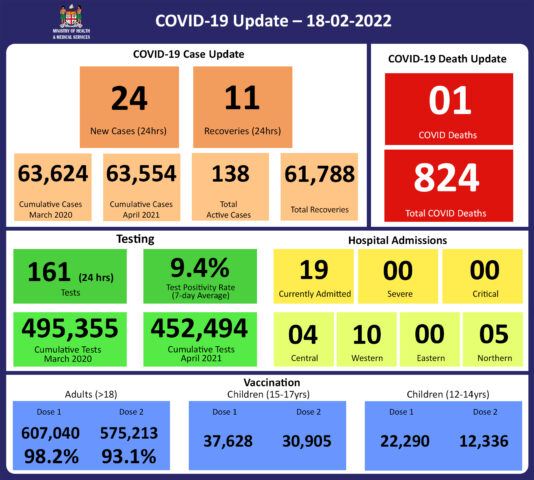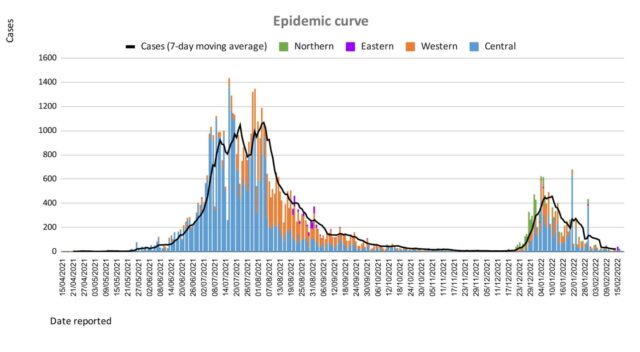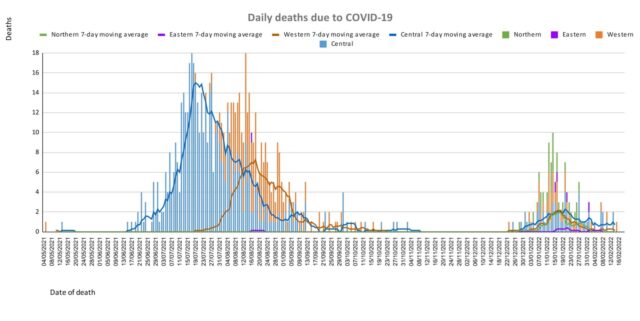COVID-19 Update 18-02-2022
COVID-19 Situation Update
Friday 18th February
Public Advisory:
Leptospirosis, typhoid fever, and dengue fever
With the recent heavy rains and flooding in parts of Fiji, we anticipate an increase in leptospirosis, typhoid and dengue fever, as these are climate-sensitive diseases that are endemic to Fiji.
In Fiji, leptospirosis is endemic and is common in both rural and urban areas where there is exposure to the urine of animals such as rats, pigs, cows, and dogs, and where there is frequent flooding, or poor drainage, resulting in people walking through muddy ground or waters. Every year we get an increase in cases noted during the wettest months from November to April. The clinical and epidemiological data indicate that males and young adults aged 20-49 years high-risk groups, and young iTaukei males are overly represented in cases and severe outcomes. The disease however can however infect anyone as the risk is mediated by greater occupational and recreational exposure to animals, soil, mud, and water. Of particular note is the playing of sports on muddy flood-affected grounds. Other risk factors include farming, working outdoors or in abattoirs; living in households that have rats living nearby; raising pigs at home, or the presence of pigs in the community.
Members of the public must understand that to prevent leptospirosis, one should avoid wading or swimming in flooded waters, wear shoes when outside, and keep all food and drinks covered and away from rats. For workplaces the importance of controlling pests, practising good personal hygiene, using protective equipment, especially footwear when in flooded and/or muddy areas.
Early treatment can decrease the severity and duration of the disease. Please seek medical care if you have recently had contact with floodwaters, mud, or animals, and develop the following symptoms: fever, muscle pain, headache. You may also have red eyes, loss of appetite, nausea/vomiting, dizziness, or feel weak. Leptospirosis can be treated with appropriate antibiotic medications prescribed by a doctor if treatment is sought early. Danger signs for severe leptospirosis include shortness of breath, coughing blood, chest pain, yellow eyes/skin (jaundice), signs of bleeding (including unexplained bruising), decreased or increased urination, difficulty staying awake. Severe leptospirosis is life-threatening, and anyone with these symptoms must be taken to the hospital immediately.
Typhoid fever is typically found in areas that do not have access to clean drinking water such as rural areas and urban informal settlements. We strongly encourage people who live in these areas, and any other areas without access to clean drinking water, to boil all drinking water. We must all also continue to practise basic hygiene measures such as frequently washing hands with soap and water, but especially after visiting the toilet and before eating or preparing food.
The WASH (Water, Sanitation and Hygiene) initiative to provide safe drinking water, proper sanitation facilities, and a hygienic environment and livelihood to people including especially the promotion of hygiene among food handlers has been an ongoing program since tropical cyclones Yasa and Ana.
Although Dengue case numbers are within the expected numbers expected for this time of the year, in the Western Division, where we are starting to see an increase after the recent heavy rain and floods, therefore, we continue to urge everyone to get rid of potential mosquito breeding places, such as empty containers outside your homes that may collect water, including discarded tires. You must also prevent yourself from being bitten by mosquitoes through the use of mosquito screens in your homes, and mosquito repellants.
The Ministry of Health and Medical Services Communicable Disease Committee has been activated and is assisting the Divisional Command Centres in responding to cases of leptospirosis, typhoid, and dengue fever, including raising awareness amongst the public and providing refresher training for medical professionals in primary care for early diagnosis and treatment.
Additionally, we have deployed specialist outreach teams to areas that are viewed as difficult to reach and at risk. We have a FEMAT team deployed to Navosa, and a mobile team led by our Hon Minister will visit communities on Kadavu island over the next few days as part of the Ministry’s community engagement strategy.
Vaccination
The booster dose program began at the end of November 2021. As of February 18th, 96,118 individuals have so far received booster doses of the Moderna and 397 individuals have received the Pfizer booster COVID-19 vaccine. For the month of February, a further 175,558 have become eligible for booster doses. We are targeting to cover all these eligible individuals in the days ahead. Please come forward to get your booster (3rd dose) vaccine if you are aged 18 or over and it has been at least 5 months since your second dose.
Increasing our vaccination coverage for the last 8% of our adult population remains a challenge, despite the increased risk of severe outcomes in this group. We remain gravely concerned that we continue to receive requests for vaccine exemption from persons with medical comorbidities, especially NCDs; their medical condition is an indication for vaccination, and granting the exemption is not an option for any qualified medical person.
During this third wave, unvaccinated deaths in the vaccine-eligible population are occurring at 17 times the rate of vaccinated deaths. This is a strong indication that many of the unvaccinated deaths in the vaccine-eligible population were preventable. I strongly urge anyone who hasn’t been vaccinated to get vaccinated now because COVID-19 is here to stay, and Omicron will not be the last variant. And if you are vaccinated, but know someone who isn’t, please also encourage them to protect themselves by getting vaccinated.
The Vaccine Plus Approach
We have had inquiries from the public on further relaxation of personal covid safe measures such as masking. As I have mentioned in the past, COVID-19 is not going to have a clean pandemic endpoint where we close off all chains of transmission and drive cases to zero. COVID-19 has an endemic endpoint, and in Fiji, as is with the rest of the world, societies will have to adapt to living alongside COVID-19 by making some deliberate choices about how to coexist.
The endemic disease does not mean unmanaged disease. Our current tracking indicates ongoing consequences especially for the vulnerable in society and the delays in seeking and reaching care is a major factor. We also have the global risk of variants developing elsewhere and spreading to Fiji.
The Vaccines Plus approach is the only means available to us. Until the consequences of COVID-19 are comparable to daily normal risks and the global threat of resurgence is low, the need for masking mandates to facilitate a public health imperative will still be needed.
So, while we have a high level of vaccination we continue to emphasize ventilation, masking, physical distancing, cough/sneeze etiquette, hand washing, and isolating from others if you have symptoms.
Hand washing and cough etiquette are immovable as public health measures. Regular hand sanitization and coughing/sneezing into a tissue or handkerchief, or the bend of your elbow, are healthy habits that protect you and others from COVID-19 and other infectious diseases. Isolating yourself, or staying away from others, when you are sick with any respiratory illness is also a good habit to protect others, especially the vulnerable.
Masking, physical distancing, and ventilation are 3 measures that must constantly be present. When one of the measures becomes difficult to apply, implementation of the other two measures must be further escalated. Whatever the scenario, an effective mask must be kept close by you at all times. The current masking requirement of wearing a mask that covers your nose and mouth is mandatory in all public places for everyone aged 8 and over, including in public service vehicles remains in force. The Ministry of Health and Medical Services has published a list of circumstances where a person is exempt from wearing a mask.
In a setting where physical distancing of 2 metres is difficult, then increasing ventilation and more strict masking practice will be needed even more. A well-ventilated indoor space refers to an indoor space wherein there is a good movement of outside air coming into the space, and inside air is going out. A poorly ventilated closed space is bad for many reasons aside from COVID-19, however, in this scenario, the physical distancing rules will increase and masking is more necessary.
For custodians of workplaces, houses of worship, and the like, balancing the relationship between ventilation, physical distance, and masking is the only way to ensure that services are COVID safe and can be customized to the principle of living with the virus. SOPs need to be configured to all activities that occur in your work or worship space in order to be COVID safe. We all want to mitigate the risk of unsustainable sick leave levels every time we get a variant, and more variants will come. Mitigating the risk of people getting sick is the best way to reduce further the risk of severe disease and death beyond the protection afforded by vaccination. Promoting good COVID safe principles in a common-sense approach is the best way to start.
Last Updated on 2 years by Publishing Team



